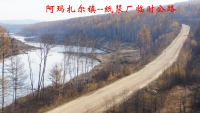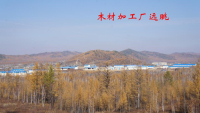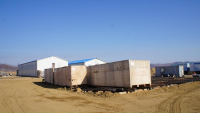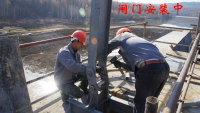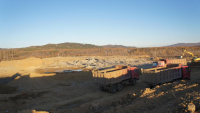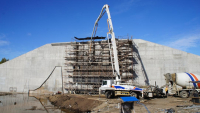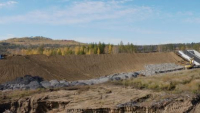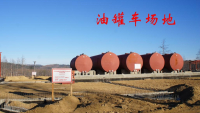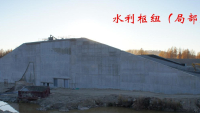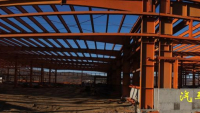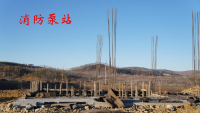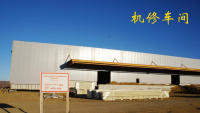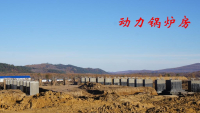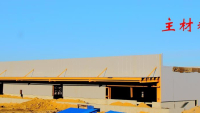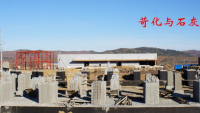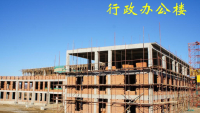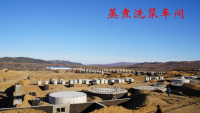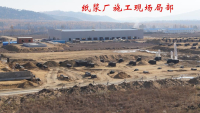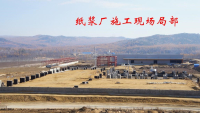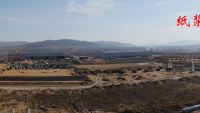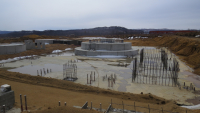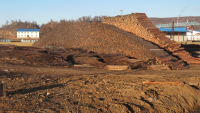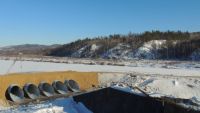Project – On record
This profile is no longer actively maintained, with the information now possibly out of datenature@banktrack.org
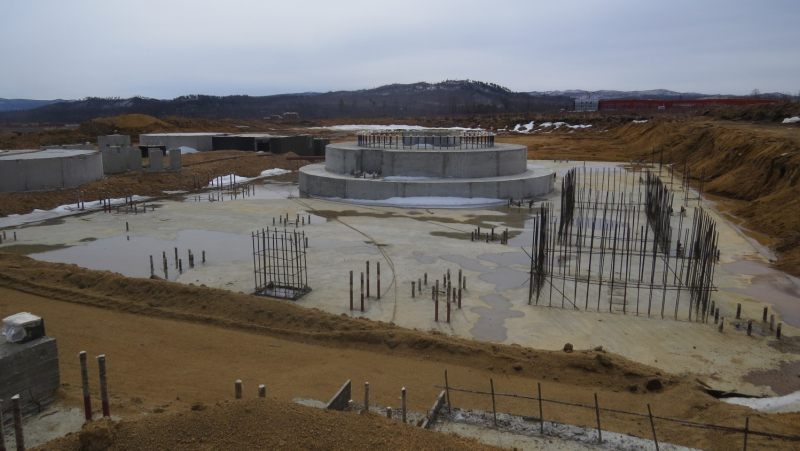
Project – On record
This profile is no longer actively maintained, with the information now possibly out of datenature@banktrack.org
What must happen
The project has been cancelled in January 2020, but there is always a risk that it is revised. It is therefore important that financiers should stay away from the project unless:
- the APSM Plan for Wood Supply and Forest Exploitation is redeveloped in a way that cannot lead to devastation of boreal forest ecosystems. This likely means further reduction in annual figures of pulp and timber production and/or sourcing significant part of wood from other provinces by rail;
- the companies ensure that APSM forest leases do not include intact old growth forests, lands important for indigenous communities or areas where nature reserves have been planned;
- a new business plan is adopted with alternative transportation routes for the needs of the APSM (to prevent destructive development of the Pokrovka-Louguhe border crossing);
- the dam is removed from the Amazar River and more sustainable water supply options (like repair of the old dam on Chichatka River) are pursued;
- APSM develops a long-term training system to enable it to meet its commitments to ensure at least half of its employees are local;
- a new plan for the APSM is subjected to a new EIA and public consultations in its entirety (as the previous EIA excluded the dam, forest leases and transportation scheme).
| Sectors | Pulp, Paper and Paperboard Mills |
| Location |
|
| Status |
Planning
Design
Agreement
Cancelled
Operation
Closure
Decommission
|
As of January 2020, the project has been cancelled. Please see 'updates' for more details.
The background of the project:
The Amazar Pulp and Saw Mill (APSM, also known as Polaris or CPK Poyarnaya) was being constructed on the shore of the Amazar river in the Zabaykalsky Province of Russia, near the border with China. The project consists of a pulp mill, two wood processing facilities, a dam and reservoir on the Amazar River and supporting infrastructure. This enterprise was fully owned by Heilongjiang Xingbang Investment Company (HXIC) from China.
The initial stage pulp mill was planned to produce 243,486 tonnes of pulp per year. The original plan was 400,000 tonnes of pulp per year, but downsized due to scarcity of forest resources. APSM was granted permission to lease almost 2.6 million hectares of forest for 49 years, almost half of it on traditional land-use areas of Indigenous Evenks and some of it in areas previously reserved for nature reserve creation. By early 2016, APSM leased and paid for only 220,000 hectares of primeval forest along the Sino-Russian border, half of which was put on the map of "last remaining old growth forests of the world". In 2018 it took additional lease of 540,000 hectares, largely in previously logged area without substantial volume of harvestable wood.
In its original plans, APSM needed to clear cut forests to obtain at least 2.1 million cubic meters of wood per year, to annually produce the necessary pulp and lumber. However, the forest resources in a 250 kilometer radius would suffice for 10 years of APSM’s operation. The problem with wood supply was officially acknowledged by the company and Russian Presidential Council on Human Rights in April 2016. The project has been cancelled in January 2020, but there is always a risk that it is revised.
Social and human rights impacts
The APSM destroys ecosystems on which livelihoods of the local population depends. 4,000 people live in the Tungiro-Olekminsky District, of which 2,000 are native Evenki Indigenous Peoples. Their land will be devastated, because up to two million hectares has been offered for forest lease. One million hectares of the Mogochinsky District are offered for forest lease, as well as the pulp mill, roads and border crossing bridge. The district is however home to 14,000 people, mostly employed in rail and mining. Two thousand of them are subsistence hunters and a hundred are professional hunters, all of whom will suffer from devastation of forest resources and poaching by incoming loggers from China. Locals are also deprived of subsistence and recreational fishing due to the dam blocking the Amazar river, built without EIA or public consultation.
There is a high level of unemployment among the local population in the region, but the company is living up to its commitment to employ local workers. In 2016 it employed 90 workers from Russia and 300 from China, although agreements prescribe at least 50% of the workforce should be local.
Moreover, the APSM has brought continuous disruption to the local community and the development of Amazar township and its regional economy. The company forms its own isolated community that competes for resources and influence with local people. It seeks to develop its own transportation routes and system, ignoring the fact that Amazar is a hub-station on the Trans-Siberian railroad. Chinese forest enterprises outcompete local businessmen in securing forest leases and make it more difficult for locals to access fire-wood and non-timber forest products. The local forest management department is overburdened by overseeing large Chinese leases and has limited capacity to serve the subsistence need of local population. The officials at the local and district level are often corrupt and provide preferential treatment to the APSM at the expense of local interests.
At the wider interprovincial level, the whole development scheme is distorted to please the APSM and its sponsors, which is best illustrated by the border-crossing issue (see ‘environment’ for more explanation).
Local activists in the town of Amazar have many times engaged in direct action to prevent violations by APSM, like extracting construction material near residents’ homes.
The concession given to the company is partly on the land of the Evenk Indigenous Peoples of central and eastern Siberia, Mongolia and Inner Mongolia. As such, the project threatens livelihoods of this indigenous group. Although the company made a statement it won’t touch land of the Indigenous Evenks, in legal terms it still has the concessions. The Zabaikalsy Province goverment is currently seeking a way to partly replace APSM's forest consessions by 721 hectares elsewhere with maximum possible production of 465,000 cubic meters of wood annually.
Most of the workers employed by the Amazar pulp mill are men. Traditionally, women collect non-timber forest products from the natural forests such as berries, mushrooms, and edible or medicinal herbs. The pulp mill is destroying such forests including its non-timber products.
Environmental and climate impacts
APSM plans to log between 1.15 million and 1.6 million cubic meters of timber every year by clearcutting, which will lead to several detrimental consequences:
- APSM will destroy biodiversity hotspots: Most of the logging is planned in primary forests. Forests presently leased by the mill for the most part are intact old-growth forests of the highest biodiversity value, home to many rare species of flora and fauna;
- APSM will lead to deforestation and devastation of resources: A Greenpeace Russia analysis of the availability of timber for APSM operations shows that the wood resources in a 250 kilometer radius are insufficient even for 10-year operation of the pulp mill. This is supported by a report of the President's Council on Civil Society Development and Human Rights in Russian Federation;
- Boreal forests of the region are slow-growing and not very productive. The area is severely affected by climate fluctuation, which causes permafrost melt and makes forest regrowth more problematic. Subsequently, regional officials also recognized that the area after fires has insufficient forest resources to support sustainable production;
- The project destroys important aquatic ecosystems: The dam built on the major tributary of the Amur river threatens the population of IUCN Red List rare salmonid fish (Hucho taimen). A smaller dam on an adjacent river has already driven down fish species numbers from 22 to just three species in less than 100 years. Significant water pollution and waste production is also expected from the pulp mill operation;
- Industrialisation of the region: The company plans to reopen the border gate Porkovka-Loguhe (Russia-China) to bring raw logs and lumber to China, as was the case between 2000-2008. Locals fear that this project and the reopening of the border will be the beginning of endless industrial devastation of the region. This road and bridge will dissect two nature reserves and open the last old-growth forests that to exploitation. The forests are present in Russia along Amur and Argun rivers, which are trans-boundary rivers. HXIC, the owner of the mill, has lobbied for this construction.
Other impacts
Heilongjiang Xingbang Investment Co (HXIC) is the owner of the APSM. As of June 2016 it has raised only half of the investment needed to complete the mill’s construction phase, according to an official audit, investment reached CNY 2.2 billion out of CNY 4.9 billion required.
At the end of 2016, the investment in the project can be divided into three groups:
- Funds provided by HXIC’s shareholders (see 'related companies'): At least CNY 750 million;
- Loans from private banks and development banks (see below). At least USD 170 million and CNY 536 million;
- Funds were expected to be obtained through Shenzhen Stock Exchange by Zoje Resources. Zoje Resources is a company raising money to buy 60% stake in HXIC. See below for a description of Zoje Recourses attempts to raise funds at the Shenzhen Stock Exchange. No investment resulted from this channel due to cancellation of the deal in 2018.
Shenzhen Stock Exchange Since 2015, the JinMa Group has been trying to sell its 60% stake in HXIC because its lacking the investment to complete the construction of APSM and to pay back the loans to China Development Bank. Zoje Recourses (ZJR), also a Chinese company, signed an agreement in June 2015 with one of the owners of JinMa Group to buy its 60% stake in HXIC if Zoje Resources managed to raise sufficient funds on the Shenzhen Stock Exchange (SSE).
The funds (of ZJR) to acquire HXIC and invest in APSM should have been raised by a non-public share offering, according to the orginal plan of Zoje Resources. However, due to falsifications, faked projects, and as a result massive public protest in Russia, potential shareholders and China Securities Regulation Commission doubted the validity of the sale until November 2015. From November 2015 to January 2017 the purchase agreement was rewritten six times, one potential buyer quit the deal, while nine other buyers decreased the amount of Zoje shares they want to buy from 5 billion to 3.5 billion. According to a Zoje disclosure document (from 21 January 2017) the China Securities Regulation Commission was delaying mandatory approval for the deal. During this process the share price of HXIC decreased by 30% from CNY 600 million to CNY 400 million. So, the 2017 share offering envisioned that out of CNY 3.5 billion raised on the stock market, CNY 240 million will be used to buy 60% of HIX, while not more than CNY 1.32 billion will be invested into the Amazar Pulp and Saw Mill.
In March 2018 the ZJR Company Board of Directors decided to apply to the China Securities Regulatory Commission for the withdrawal of the non-public offering of shares, and to terminate the relevant agreements with the equity transferors, specific investors, and intermediary agencies. The whole transaction was cancelled.
See for more information on the Zoje Resources and SSE here and here. Zoje Resources commissioned New Times Securities Co to be its sponsor for the private offering. The SSE disclosure documents are listed here.
Hong Kong Stock Exchange (HKEX) In March 2019 Kiu Hung International announced an intention to buy a major stake in Polaris for HK$ 800 million (USD 102 million) and then in May 2019 it signed an MOU to acquire rights for management of Polaris project without buying it (see Updates from August 2019). Kiu Hung International was recently censured by HKEX for improper disclosure on other deals and it may happen again if the firm does not improve disclosure on transactions related to this particularly problematic project.
Heilongjiang Xingbang Investment (HXIC) fully owns the Amazarsky pulp and saw mills. APSM, and several small affiliated firms, is the only current activity of HXIC. It is the principal owner and operator of all forest industry assets that comprise APSM. HXIC is currently owned by two companies: JinMa Group owned by Mr. Xu Jianchu (95%) and provincial Long Xin Heilongjiang Overseas Resource Investment 5%). Zoje Resources Investment has tried to buy a 60% stake in HXIC since June 2015, but has not managed to raise funds at the Shenzhen Stock Exchange. The deal was called off in March 2018. Since then various attempts to raise investment funds have been undertaken by Mr. Xu Jianchu.
Project sponsor
Heilongjiang Xinban Investment Co
ChinaOther companies
Andritz
AustriaKiu Hung International
Hong KongPolyarnaya
ChinaChina Agriculture Blue Industrial On 11.11.2018, a local website of Xiaoshan Town (where hotels owned by the JinMa Group are located), reported that Xu Jianchu's Jinma Group joined forces with 香港祥业集团有限公司 Hong Kong Xiangye Group Co., Ltd and央企中国蓝田总公司[l1] China Lantian Corporation to establish 中农蓝实业有限公司 China Agriculture Blue Industrial Co., Ltd. to promote Amazar and other pulp projects. The text claims that they will invest 30 billion yuan to develop capacity for 5 million ton of pulp from straw in China and 5 mill ton pulp from forests of Russia.
Julian International Group Co., Ltd., Guangcai Group and Sibgiprobum
In April 2019, another report described an investment agreement celebrated at HK Marriot Hotel where the "Kiu Hung International (00381.HK) forest pulp integration project conference" was held. Besides Kiu Hung, the event speakers included Technical Director of Julian International Group Co., Ltd. Mr. Xu Jianchu (徐建初) and the director of Russian Siberian Pulp and Paper Design Bureau (Sibgiprobum) Mr.Goncharov. Mr. Xu Jianchu’s speech revealed that the project has been endorsed by the central government and the National Development and Reform Commission andin the future, after successfully applying for the national-level overseas industrial park, the project will receive 400 million yuan of state-specific subsidies, 800 million yuan of discount loans and other subsidies of 600 million yuan.
The same report also claims that after that Guangcai Group (光彩集团)and Julian International Group held a grand signing ceremony for strategic cooperation. Mr. Ren Yi, Chairman of Guangcai Group, said in his speech that in view of the infinite prospects of the forestry pulp integration project, Guangcai Group decided to provide up to 10 billion yuan of financing services for the forestry slurry integration project. Among them, 2 billion financing will be provided by Guangcai Group as an initiator, and another 8 billion yuan will be raised through bonds.
All those celebration events have been co-organized by Xu Jianchu, the owner of JinMa Group, which continues to control HXIC. However, a likely reason that complicates the finalizing of the investment agreement, is the fact that assets were frozen in the first half of 2019 as a consequences of a court case filed by Heilongjiang Investment Company against Xu JianChu and his companies including Heilongjiang XingBang Guoji.
Applicable norms and standards
2012 Green Credit Guidelines obligate Chinese banks to comply with “international norms and best practices” when abroad, and the 2009 Guidelines on Corporate Social Responsibility of Financial Institutions ask that Chinese financiers should develop their business plans “in light of international treaties, international practice and industry guidelines”.
2013 Guidelines on Environmental Protection for Foreign Investment and Cooperation “encourage enterprises to research and learn from principles, standards and practices with respect to environmental protection that are adopted by international organizations and multilateral financial institutions”, which include standards such as the Equator Principles.
Shenzhen Stock Exchange has very extensive disclosure requirements judging from at least 30 detailed documents related to this single unfinished transaction posted on web-sites.
See 'documents' for two analyses of China Development Bank's foreign investment policies.
2020
2020-10-27 00:00:00 | Prime minister Mikhail Mishustin adopted development program for the Fart East
On 28 September, the Prime Minister of Russia Mikhail Mishustin adopted the "Program for socio-economic development of the Far East till 2035". The main goals of the program are to “fasten the economic development of the region, make the demographic situation better, stop migrations and make people’s quality of life better”.
The program also consists of proposals to establish special investment conditions for key economic sectors of the Far East region, to lower barriers for investment in these sectors. Forestry and agriculture are included in the key sectors. For the Zabaykalsky Province, the program lists a ‘cellulose plant’ without a name or timeframe. Local media however suspect this will be the Amazar Pulp Mill.
At the same time, President Putin instructed the Russian government to stop the uncontrolled export of unprocessed timber. Putin acknowledges the potential of the Far East region its ‘competitive positions, meaning low cost of forest recourses’, but wants to a halt to ‘smuggling’. This will likely result in an increase in subsidies for wood processing facilities, including pulp mills.
These two developments might lead to a revival of the Amazar Pulp Mill.
2020-01-10 00:00:00 | Plans for Amazar pulp mill canceled
Kiu Hung announced the decision of its Board of Directors that it will not proceed with the Amazar pulp mill project. The voluntary announcement states, “The company hereby announces that in light of the potential risks in relation to the project as disclosed in the announcement of the company dated 4 November 2019, the board has decided not to proceed with the project and to terminate the operation and management contract with Polaris."
The announcement comes after NGOs notified the Hong Kong Stock Exchange about the fact that Kiu Hung had failed to disclose a series of risks related to the project in its September 2019 disclosures, thus misleading its shareholders.
2019
2019-07-31 00:00:00 | Territory of accelerated development in Zabaikalsky Province announced
The Russian government by Decree#988, issued on July 31, 2019, established a "territory of accelerated development" in the Zabaikalsky Province which is associated with greater easements and state subsidies for improving infrastructure needed by investors. The Amazar forestry complex is one of these clusters, although no detail on intended activities are available beyond the fact that “pulp and paper production” is among the target industrial activities, which in that area could be attributed only to the Amazar Saw and Pulp Mills (Polyarnaya). The Decree is not specifically focused on the project in question, but addresses fifteen different areas and more than twenty types of activities which may be encouraged in this province, as it is experiencing extreme economic depression due to long-term mismanagement.
2019-05-23 00:00:00 | Amazar Project excluded from list of priority forest industry projects
On May 22, 2019 the Polaris/Amazar project was finally excluded from the List of “priority forest industry projects” by the Russian Ministry of Trade and Industry (ministerial order #1734). This means all forest leases it obtained without tenders should be annulled in 2019 and the 50% easement difference in forest lease fees should be paid back to Russian National Treasury (Russian Ministry of Trade and Industry). This also has been confirmed by local media, which on August 21 published a scanned copy of the ministerial order.
2019-05-23 00:00:00 | New potential investor for the Amazar Pulp and Saw Mill
On May 23rd 2019, KIU HUNG INT侨雄国际 (HK 00381) a toy and wine making company listed on the Hong Kong Stock exchange, of mainland China origin, signed an MOU with “Polyarnaya CPK” owners, to take over general management of the Polaris project for 20 years (without getting ownership) and to get 75% of the profits. There is no capital commitment/investment amount required in the contract. A 100 million deposit in promissory notes ensures that the equipment will not be stolen nor broken. The company shall be responsible for coordinating and supervising the project from the planting of trees to pulp sales (including but not limited to planting, harvesting, transportation, cutting, bleaching, chemical processes). The company will subcontract different portions or individual processes to other specialized companies or other agencies and will employ experts to supervise the work progress, quality and results of subcontractors through establishing a branch in Russia.
Earlier, in March, a much more ambitious preliminary agreement was drafted by the same company with HK companies owned by Xu JianChu – owner of the Polaris/APSP. This deal did not proceed, likely because of the freezing of assets as a consequences of a court case filed by Heilongjiang Investment Company against Xu JianChu and his companies including Heilongjiang XingBang Guoji.
On May 30 KIU HUNG INT issued more detailed description of the project, which has many inaccurate statements and glaring gaps:
* It claims that Polaris controls 3 million hectares with the total stock volume of harvestable production wood on forest lands during the lease period is of 144 million m3 – basically overestimating it manifold. Furthermore, all forest leases are likely to be cancelled due to the cancellation of preferential status.
* It does not clearly mention multi-billion debts of the project to the CDB and close time of their maturity.
* It does not describe the outcomes of several court cases which earlier in April 2019 resulted in freezing of many assets belonging to Xu Jiangchu- the principal owner of Polaris.
* There is no feasibility study nor an audit. Even the amount of effort and investment needed to put APSP project in operation has not been estimated. Meanwhile in official documents issued in April 2019 they still need to invest at least HK$ 2 billion just to launch the 1 phase of the pulp mill.
On June 12, 2019 the KIU HUNG INT got censured by HK Stock Exchange Management for violating Listing rules on disclosure and fires all old directors. New team comes on board.
On July 25 they disclose intention to issue bonds worth 500 million HK$, out of which 50 million may go to advance APSP and the rest to pay debts and operational needs. On August 8 they withdraw the bond issuance.
On July 29 they announced that the five-year promissory note in the amount of HK$100 million has not yet been issued to the APSP owners and will be issued only after relevant handover procedures to validly authorize the Company the rights to manage and operate Polaris’s contracted assets under the Contract including but not limited to existing plants, machineries and forest resources, are completed to the satisfaction of the Company.
In addition, the Company is about to establish a wholly-owned subsidiary in Russia and plans to invest HK$50 million as the start-up capital of the Project. In order to achieve the Company’s expected return from the Project upon completion of the Contract, the Group has employed Mr. Chen Jianing (陳嘉寧先生) (‘‘Mr.Chen’’) and Mr. Chu Haoran (儲浩然先生) (‘‘Mr. Chu’’) as the project director and the project consultant respectively for the management and operation at the first stage of the Project.
2018
2018-03-19 00:00:00 | Termination of non-public offering Zhongjie Resources Investment Co.
Shengzhen Stock Exchange has reported that the Board of Directors of the Zhongjie Resources Investment company (ZJR) decided to terminate the non-public issuance of stocks, and applied for withdrawal from the China Securities Regulatory Commission. The centerpiece of that bundle was the Amazar Pulp and Saw Mill.
2012
2012-11-14 00:00:00 | Amazar pulpmill project started with beam production
Chita, Transbaikal, Russia. Another media confirmed that first stage of Amazar pulpmill project ‘'Polyarnaya'', is launched in Zabaikalskiy region. It is a joint Russian-Chinese project with total investment scope of USD 215 million, including the infrastructure (source: whatwood.ru).

